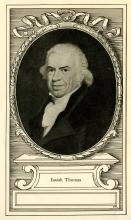In 1765, 25 August was a Sunday, so the Rev.
Jonathan Mayhew preached a sermon at the West Meetinghouse in Boston.
Mayhew was one of the town’s most radical
ministers in two ways:
- Though a strong Congregationalist, he leaned theologically toward Arianism, or what in a couple of generations many upper-class Bostonians would adopt as Unitarianism.
- He was willing to argue in a famous 1750 sermon titled A Discourse Concerning Unlimited Submission that the English Revolution of the 1640s was a Good Thing.
In the early 1760s, Mayhew took the lead among Boston’s ministers in inveighing against the possibility of a Church of England bishopric in America, prompted in large part by the Rev.
East Apthorp building a big house for himself in
Cambridge. Mayhew of course saw bishops as a Bad Thing.
By 1765 Apthorp had left for London, never to return to his native Massachusetts. From there he kept up the debate by publishing
A Review of Dr. Mayhew’s Remarks on the Answer to His Observations on the Charter and Conduct of the Society for the Propagation of the Gospel in Foreign Parts. “Yet, I think,” Apthorp wrote in conclusion about Mayhew, “his Zeal in this dispute has not been always conducted by Knowledge or tempered with Charity.”
In August 1765, Mayhew’s mind was on the
Stamp Act. On the 8th he told his English supporter
Thomas Hollis, “These Measures appear to me extremely hard and injurious. If long persisted in, they will at best greatly cramp, and retard the population of, the Colonies, to the very essential detriment of the Mother country.” (I’m taking these quotes from J. Patrick Mullins, author of the recent intellectual biography
Father of Liberty: Jonathan Mayhew and the Principles of the American Revolution.)
On the 14th, the
Loyall Nine organized the first out-of-doors protest against that new law. That evening, a
mob attacked stamp agent
Andrew Oliver’s office and home. Five days later, Mayhew wrote to Hollis: “I did not think the spirit of opposition to the Stamp-Act would break out so soon, in any open Acts of Violence, as it has done.” He warned that enforcing the
law would require the Crown to use “a large
army, or rather…a number of considerable ones, at least one in each Colony.” And that would be a Bad Thing.
Some people in Boston, Mayhew later said, asked him to preach about the Stamp Act. According to Lt. Gov.
Thomas Hutchinson, “notice being given that he was to preach a political discourse he had a crowded audience” on the afternoon of 25 August. (That said, I haven’t found an account from anyone who was actually in the congregation that day.)
As his text Mayhew chose Paul’s Epistle to the Galatians, chapter 5, verses 12-13:
I would they were even cut off which trouble you. For, brethren, ye have been called unto liberty; only use not liberty for an occasion to the flesh, but by love serve one another.
Or did he? Hutchinson told Apthorp that Mayhew had left off the words after the first
liberty, “the remainder of the sentence not being to his purpose.” We can’t be sure since Mayhew didn’t write out this sermon but extemporized from notes.
Days later, the minister tried to recreate what he had said—or what he hoped he had said. That memorandum declared that it would be an abuse of liberty for people to “disregard the wholesome laws of Society, made for the preservation of the order and common good thereof”; to “causelessly & maliciously speak evil of their rulers,…or to weaken their influence, and proper authority”; or to “rebel against, or resist their lawful rulers, in the due discharge of their offices.”
But was the Stamp Act a wholesome law, made to preserve the common good? Could a North American stamp agent act with proper authority? Were officials who advised people to obey the new law duly discharging their offices? Mayhew’s memorandum ended suddenly without spelling out his argument about how the Stamp Act and rioting against it could both be Bad Things.
Friends of the royal government felt that Mayhew wasn’t clear enough, or even suggested that the Stamp Act was such a Bad Thing that violent rebellion against it was a Good Thing. Judge
Peter Oliver later claimed that Mayhew “preached so seditious a Sermon, that some of his Auditors, who were of the Mob, declared, whilst the Doctor was delivering it they could scarce contain themselves from going out of the Assembly & beginning their Work.”
TOMORROW: Monday comes.





